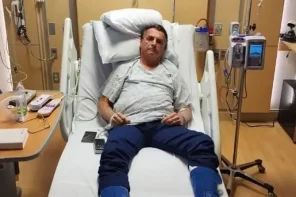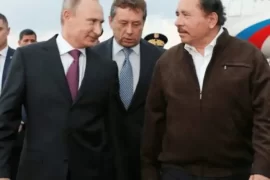On 19 February 2023, Dorin Recean, the newly-appointed Prime Minister of Moldova, called for the demilitarization of Transnistria through the disarming of the Transnistrian Armed Forces and the expulsion of the Russian troops stationed there. Two days later, Ukrainian troops were deployed along the Ukrainian-Transnistrian border, and Russian war-related Telegram channels started to speculate about a potential Ukrainian invasion of Transnistria. On 23 February, the Russian Ministry of Defense (MoD) accused Ukraine of conspiring to invade Transnistria under fabricated pretexts and warned Ukraine to refrain from such activities. On the next day, the Moldovan MoD rejected the Russian claims. However, on 27 February, the Ukrainian Armed Forces declared that they were concentrating troops along the border of Transnistria. On the same day, Hungarian airline Wizz Air suspended all flights to Moldova starting from 14 March, citing security risks. On the whole, it appears that Transnistria might become a new battleground in Eastern Europe between Russia and Ukraine. But why now?

Moldova is a landlocked state sandwiched between Romania and Ukraine. A former Soviet republic, it is populated primarily by ethnic Moldovans (or Romanians, depending on the perspective). Following Moldova’s declaration of sovereignty from the USSR in June 1990, Transnistria, formally called the Pridnestrovian Moldavian Republic (PMR) and located mainly on the territory between the Dniester River and the Ukrainian border, declared its independence from Moldova in September 1990. Transnistria is populated by a mix of Russians, Ukrainians and Moldovans, and a significant part of the Transnistrian population was opposed to the pro-Romanian nationalistic government of Moldova. Consequently, the Moldovan Armed Forces, bolstered by Romanian military advisers and volunteers, fought a war against the Transnistrian Armed Forces, backed up by Russian and Ukrainian volunteers, between November 1990 and July 1992.
In June 1992, the 14th Guards Army of the Russian Armed Forces, based in Transnistria and sympathetic to the PMR, intervened in the war and enforced a ceasefire. After that, the Joint Control Commission (JCC), a trilateral peacekeeping force consisting of Russian, Transnistrian and Moldovan troops, was created and tasked with monitoring the ceasefire. At the same time, a 1,500-strong Russian troop contingent was officially tasked with the protection of the Cobasna ammunition depot, which is one of the largest logistics centers in Eastern Europe. Since then, Transnistria has functioned as a de facto independent state. However, Moldova continues to regard it as part of its territory, and no member-state of the United Nations (UN) has recognized it yet.
Since its independence, Moldova’s internal politics has been plagued by conflicts between pro-Russian and neutralist factions on one side and pro-Western and pro-Romanian elements on the other side. Since 1994, Moldova has been a constitutionally-mandated militarily neutral state. Following the 2020 Moldovan presidential election, pro-Russian President Igor Dodon was replaced by strongly pro-Western and pro-Romanian President Maia Sandu. Under President Sandu, who holds both Moldovan and Romanian citizenships, Russian-Moldovan relations have predictably undergone a downward spiral. She has called for Russian withdrawal from Transnistria, termed Transnistria as an ‘artificial’ entity, pushed for integration with Romania and sought the membership of the European Union (EU). Following the outbreak of the Russian-Ukrainian War, Moldova strongly condemned Russia and applied for EU membership. At the same time, it was speculated that Ukraine might invade Transnistria, but such an invasion did not materialize then.
However, the Russian-Ukrainian War hit Moldova in a different manner. The war, coupled with the rift between Moscow and Chișinău, caused a hike in the price of natural gas, resulting in an energy crisis and inflation. The looming economic crisis, coupled with the opposition of a substantial part of Moldova’s population to Moldova’s growing integration into the West and the Moldovan government’s persecution of opposition politician Ilan Shor, has resulted in large-scale anti-government protests in the country since September 2022. The Moldovan government accused Russia of orchestrating the protests, imposed restrictions on rallies and initiated the process of delegitimizing opposition parties. Meanwhile, the United States of America (USA) imposed sanctions on some Moldovan opposition politicians, accusing them of having links to Russia. However, these measures have so far failed to quell the protests.
Meanwhile, the speculations about the possible Ukrainian invasion of Transnistria re-emerged with greater intensity in February 2023, preceded by a series of possibly interrelated events. On 21 January 2023, Moldovan President Sandu mentioned the possibility of the abandonment of neutrality and admission into a ‘major alliance’ (i.e. NATO). On 2 February, Russian Minister of Foreign Affairs Sergei Lavrov responded that Moldova might face Ukraine’s fate in case it sought NATO membership. On 9 February, Ukrainian President Volodymyr Zelenskyy ‘informed’ President Sandu of an alleged Russian plot to ‘overthrow the Moldovan government’. On the next day, the Moldovan cabinet resigned owing to the political crisis in the country.
On 13 February, President Sandu accused Russia of plotting to overthrow her government. Two days later, NATO Secretary General Jens Stoltenberg declared that NATO member-states are ready to provide military assistance to Moldova. On 16 February, a new cabinet headed by Prime Minister Recean took power, with Recean immediately calling for the abandonment of Moldova’s neutrality. On the next day, President Zelenskyy stated that Russia is seeking to attack Moldova. After that, Prime Minister Recean called for Russia’s expulsion from Transnistria, and Ukraine started deploying troops along Transnistria’s borders. Meanwhile, on 21 February, US President Joseph Biden met with President Sandu in Poland and offered ‘strong support’ to Moldova, while Russian President Vladimir Putin revoked a 2012 decree on the same day that recognized Moldovan sovereignty over the Transnistrian conflict.
So, the pro-Western Moldovan government is facing an internal political crisis, which Russia is assumed to be exploiting. Meanwhile, the Moldovan government is seeking EU and potentially NATO membership and attempting to regain control over Transnistria by crushing pro-Russian opposition political parties. A successful Moldovan-Ukrainian offensive against Transnistria would strengthen the Moldovan government vis-à-vis the protesting opposition parties and shatter Russian influence over Moldova. Precisely for this reason, the USA and NATO are fully supporting the Moldovan government, while Ukraine is acting as the ‘military muscle’ of the West. Moldova, which holds de jure sovereignty over Transnistria, can legally call upon Ukraine to intervene in the region at any time of their choosing, and Ukraine can invade the Russian-backed ‘statelet’.
The small Transnistrian Armed Forces and Russian contingent would unlikely be able to resist a joint Moldovan-Ukrainian offensive for long, while reinforcing the Russian contingent in Transnistria (between two hostile powers) would be very difficult for Moscow. This might tempt Ukraine into launching an attack on Transnistria. If Ukraine succeeds in occupying Transnistria, that would provide them with a major propaganda victory against Russia. It could also help them manage their shell shortage by allowing them to capture the Cobasna depot. Moreover, it would help Ukraine make up for any credibility loss that it might have to face after the impending Russian occupation of Bakhmut. For the West, it would be a strategic victory over Russia. However, in such an event, Russia’s possible reaction would be unpredictable and might include dangerous escalations, such as nuclear sabre rattling.
On the other hand, if Moldova and Ukraine initiate an offensive against Transnistria but fail in the endeavor, that might have severe repercussions for all the parties involved. Such an event might weaken Ukraine both militarily and politically, and it might further destabilize, or even overthrow, the Moldovan government. Moreover, if the Cobasna depot is detonated, the resulting explosion would cause large-scale destruction in the region. This would produce a humanitarian crisis of the highest magnitude.
There might be a third possibility as well. It is possible that by deploying troops near Transnistria, Ukraine is simply trying to divert Russia’s attention. Such diversion might be aimed at slackening Russian war efforts at Bakhmut or concealing the preparations for a new offensive against the Russian forces. However, no prominent observer of this war has so far advanced such a scenario, and so this possibility might represent a minoritarian view of the unfolding situation near Transnistria.
To conclude, the potential Ukrainian invasion of Transnistria or a joint Moldovan-Ukrainian offensive into the region would add a new and dangerous dimension to the ongoing Russian-Ukrainian War and the Russian-Western strategic competition. Therefore, the situation along the Ukrainian-Transnistrian border should be carefully monitored in the upcoming few weeks.
Md. Himel Rahman is a post-graduate student of Security Studies at the Department of International Relations in the University of Dhaka and a regular contributor to Roar Media.







